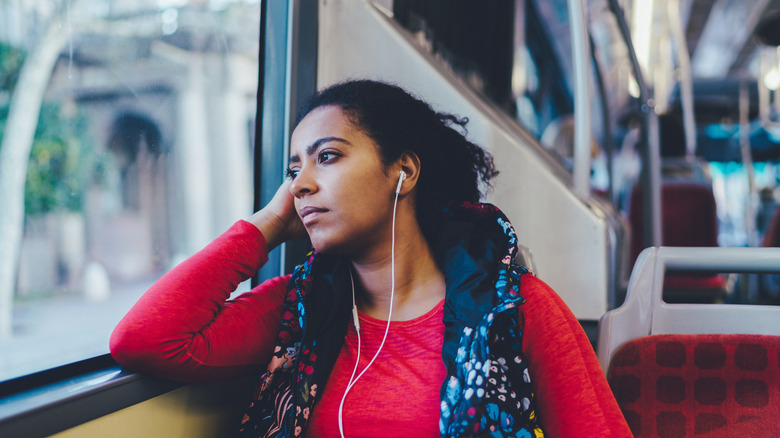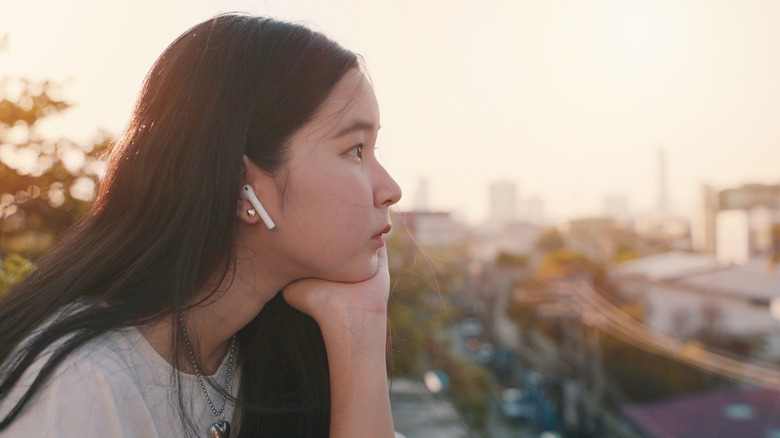Listening To Sad Music Is A Good Thing, Actually
We may receive a commission on purchases made from links.
Maybe you've just gone through a breakup. Perhaps you fought with your best friend, and now things are tense. It could just be because you live in the world, which is a complete mess right now. You're sad. Logic would dictate that when we're upset, we would want to listen to happy music. No, we humans are obstinate creatures; we gravitate toward sad ditties that might make us cry or linger in a blue state for a while. It doesn't sound like it makes sense, and yet we all do it. If you open up your Spotify playlists, it's very likely that you have one that is designed for when you have the weepies.
Odd as it may sound, there is actual science behind why we want to listen to sad songs rather than bouncy tunes when we're upset. It's partially biological, and partially psychological, but it certainly made us feel better about turning on Loreena McKennitt, Johnny Cash, or Coldplay after that person was mean to us in the checkout line. (Note: We care about you, and if you're having a mental health crisis, please don't just listen to a few songs. A helpline is included below.)
It's biological
So wait, our brains want us to listen to sad songs? As it turns out, they do. Psychology Today posted an explanation from "Music Expectancy and Thrills," in the book "Handbook of Music and Emotion: Theory, Research, Applications." They explain: "At the biological level, sad music is linked to the hormone prolactin, which is associated with crying and helps to curb grief ... Sad music tricks the brain into engaging a normal, compensatory response by releasing prolactin. In the absence of a traumatic event, the body is left with a pleasurable mix of opiates with nowhere else to go. Prolactin produces feelings of calmness to counteract mental pain."
Basically, that means that when we're sad, doing things we associate with sadness, like crying or listening to sad music, releases a hormone that makes us feel better. SpiritTune has another way of explaining prolactin: "Among its numerous functions, prolactin is considered to modulate feelings of sadness by preparing the body to deal with traumatic events. It fends off overwhelming feelings of grief by enhancing calmness and, in some cases, even pleasure." Listening to sad music can release dopamine, which produces good feelings. Think of that the next time you listen to Adele's "Someone Like You" for the seventh time in a row. It's brain medicine.
It can help us process emotions in a less scary way
When you're feeling low, things can get scary. Logic goes out the window, and we start to feel emotions that can seem like they're never going away. Listening to songs that make you cry can actually distance you from those emotions and let you process them better. Psychology Today points out that it helps with mood regulation. The site explains: "Sad music produces psychological benefits via mood regulation. Sad music enables the listener to disengage from distressing situations (breakup, death, etc.) and focus instead on the beauty of the music."
Sometimes happy music can feel really "off" when we're sad, and ScienceABC presents a good reason for that: "This is because, while sad music comes across as an empathic person trying to console you, happy music may instead seem like a perky person telling you to smile when you're annoyed." Ooh, yeah, no one wants to hear "cheer up," or "get over it." That can freak us out or make us think we're doing something wrong. It's okay to be sad. Whoever wrote that song that makes you tear up every time felt it just like you do, which brings us to the next point. Sad music can make us feel less alone with our emotions.
Feeling less alone
Listening to "Mad World" might actually make you feel like you're hanging out with a friend who gets you. Sometimes, though, that friend might be the one telling us to cheer up or texting us dad jokes, and it makes you feel like you have to respond in kind. There is a term called "parasocial relationships" that might help us understand here. Yes, you probably heard about the negative side of that term during the whole John Mulaney/Olivia Munn press extravaganza, but it can be positive as well.
It's the relationship that we sometimes develop with a fictional character (or celebrity, but that's outside of our purposes today). With a one-sided relationship like this, whether it's a character on a TV show or the character the song is about feeling a similar emotion, you can feel less alone with it all, without the need to protect someone else's feelings. It lets us remember that we are not the only ones to experience these emotions. Maybe knowing someone else was able to cry about something means that it's okay for us as well.
It can also help us develop empathy. As SpiritTune explains, "The realization that other people have indeed been through what you are going through can help you feel more understood, more connected, and even more at peace with the situation. In this way, music that aligns with our current emotional state can prompt feelings of belonging and/or evoke the comforting experience similar to sharing our sorrows with a good friend."
If you or someone you know needs help with mental health, please contact the Crisis Text Line by texting HOME to 741741, call the National Alliance on Mental Illness helpline at 1-800-950-NAMI (6264), or visit the National Institute of Mental Health website.



